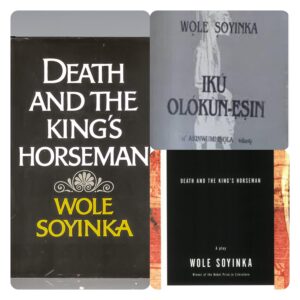
By Ibrahim Kegbegbe
In African literature, few works interrogate the paradox of human power and inevitable death as profoundly as Wole Soyinka’s Death and the King’s Horseman. First staged in 1975, the play dramatizes a Yoruba ritual in which the king’s horseman, Elesin Oba, must accompany his deceased ruler into the afterlife to preserve cosmic balance. The tragedy arises when colonial officials, unable to comprehend the ritual’s meaning, intervene to prevent the suicide. The consequence is not the preservation of life but the disruption of a spiritual order.
Years later, the late Yoruba novelist and playwright Akinwumi Isola returned this iconic work to its mother tongue under the title Iku Olokun-Ẹsin. His translation does more than substitute words; it restores the play’s rhythm, proverbs, and cadences into the Yoruba cultural universe from which it emerged. In doing so, Isola amplifies the play’s central theme — that death is the unavoidable destiny of all power, all life, and all objects on earth.
Duty and Obligation
In Soyinka’s original, Elesin’s duty is framed as both inevitable and necessary:
“The road is prepared, the drums already summon me. The world has need of my death, just as the earth has need of rain. To delay is to betray the trust of the ancestors.”
Isola’s Yoruba rendering echoes this sense of inevitability, but with proverbial weight:
“Ọ̀nà ti ṣí, ìlù ti ń pè mí. Ayé nílò ikú mi bí ilẹ̀ ṣe nílò òjò. Tí n bá pé jù, ó dà bí ẹni tí ń tan ìgbàgbọ́ àwọn bàbá ńlá jẹ.”
Here, death is not an accident but a covenantal duty, a sacred rain without which the earth’s cycle falters.
The Colonial Interruption
The play’s tragedy sharpens when foreign interference intrudes. Elesin’s lament is clear:
“You hold me back with your laws, but your laws have no power in the land of spirits. A life delayed is not a life saved; it is a world thrown out of balance.”
Translated into Yoruba, the words become even more cutting:
“Ẹ̀yin dì mí mọ́ nípa òfin yín, ṣùgbọ́n òfin yín kò ní agbára ní ilẹ̀ ẹ̀mí. Ẹ̀mí tí ẹ fi sílẹ̀ kì í ṣe ẹ̀mí tí ẹ gbà; ayé ló ń bàjẹ́ nípa bẹ́ẹ̀.”
What emerges is the futility of human law before the inevitability of death. The colonial officials imagine themselves saviors, yet the Yoruba worldview insists that delaying death does not conquer it; it only disfigures the cosmic order.
Collapse When Death’s Order Is Broken
The consequence of Elesin’s failure is devastation, both personal and communal:
“Because I did not ride the final path, the world is wounded. The sun hides its face, the drums beat in sorrow. Power crumbles when death is denied its due.”
Isola’s Yoruba version deepens this lament with ritual imagery:
“Nítorí pé mi ò rìn ọ̀nà tó gbẹ́yìn, ayé ti ní ipalara. Òórùn bòjú pa, ìlù ń lu pẹ̀lú ìbànújẹ. Agbára ń ṣubú nígbà tí a bá kọ́ ikú ní ẹ̀tọ́ rẹ̀.”
The imagery of the sun covering its face and drums resounding with grief reminds us that when death is denied its ritual fulfillment, society itself is thrown into disarray.
Death as the Master of All
Both versions return to the universal message that power, wealth, and earthly grandeur cannot evade death:
“The world is never a void. The moment one life departs, another must follow… Death is the master of all, and no man, no power, no wealth can escape its hand.”
READ ALSO:Oluremi Tinubu Crowned ‘Princess of War’ in Gombe
Isola’s Yoruba locates this inevitability in oral wisdom:
“Ayé kì í ṣofo. Nígbà tí ẹ̀mí kan bá bọ́ lọ, ẹ̀mí mìíràn gbọ́dọ̀ tẹ̀lé e… Ikú ló jẹ́ olórí gbogbo ayé; kò sí ènìyàn, kò sí agbára, kò sí owó tó lè sá kúrò ní ọwọ́ rẹ̀.”
Death, here, is not only a biological certainty but a cosmic ruler.
READ ALSO:Ambassador Ajadi Celebrates Latop International CEO, Omojola, on Birthday
In Soyinka’s Death and the King’s Horseman, death is both destiny and duty; in Isola’s Iku Olokun-Ẹsin, that destiny is voiced in the idioms of Yoruba culture, where proverbs and chants make death’s inevitability inescapable. Together, the works affirm that no power — be it a king, a horseman, or even colonial law — can resist the pull of ikú. The inevitable end comes for all, yet its meaning lies in whether death fulfills its cosmic purpose or whether human pride disrupts its ordained path.
By Ibrahim Kegbegbe
Journalist and Public Affairs Analyst | Lagos, Nigeria

















